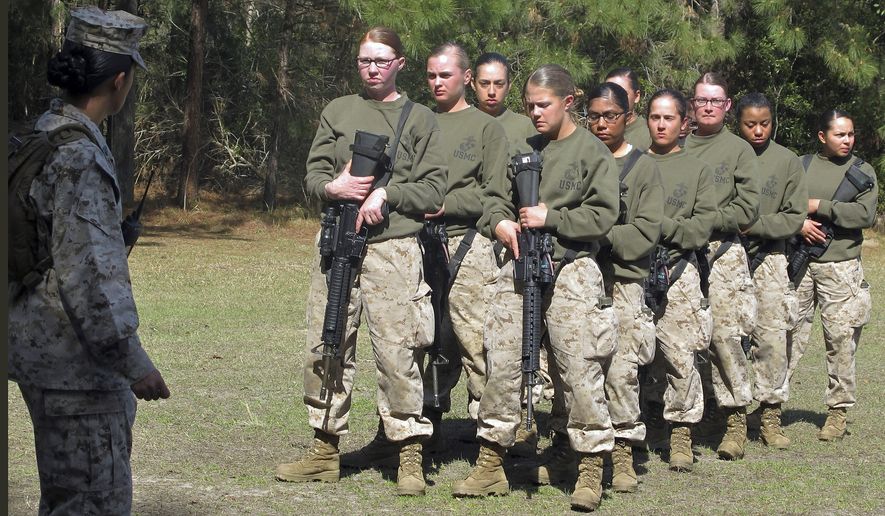The Pentagon says the country should stick with mandatory registration for a military draft, and it advocates a requirement for women to sign up for the first time in the nation’s history.
The recommendations are contained in a Defense Department report to Congress that serves as a starting point for a commission examining military, national and public service.
Congress ordered the Pentagon report, and the office of the undersecretary of defense for personnel and readiness completed it in the early months of the Trump administration.
Currently, only male citizens and residents age 18-25 are required to register, for a pace of about 2 million each year.
Women, whom the government has never ordered to sign up, would add 11 million to the Selective Service System database “in short order,” the report says.
President Carter restarted draft registration in 1980 as a message to Soviet leaders. Congress exempted women because they did not perform combat.
DOCUMENT: Read the Pentagon's report recommending women be draft eligible
But today women fly combat aircraft, serve on combat ships and are in the early stages of competing for direct ground combat jobs such as infantry and special operations.
“It appears that, for the most part, expanding registration for the draft to include women would enhance further the benefits presently associated with the Selective Service System,” the Pentagon report states.
A gender-neutral registration, the report says, “would convey the added benefit of promoting fairness and equity not previously possible in the process and would comport the military Selective Service System with our nation’s touchstone values of fair and equitable treatment, and equality of opportunity.”
Congress came close last November to enacting a law that would require women to sign up, with Republican and Democratic backing. An amendment cleared the House Armed Services Committee, but Republican leaders scuttled the move and instead created a commission to conduct a two-year examination.
The Pentagon report, titled “Report on the Purpose and Utility of Registration System for Military Selective Service,” makes two other significant findings.
First, there is no foreseeable reason to restart conscription to augment the 2.1 million all-volunteer active and reserve force.
“The Department of Defense currently has no operational plans that envision mobilization at a level that would require conscription,” the Pentagon says. “Even in the face of sustained conflicts in Iraq and Afghanistan, DoD has maintained its ability to recruit and retain a professional volunteer force without resorting to a draft.”
Second, the report says registration should stay because of a number of benefits.
For one, it sends a strong message to world adversaries that, if necessary, the U.S. can conduct a mass mobilization.
“Eliminating military selective service could be interpreted by adversaries of the United States as a potential weakness, thus emboldening existing or potential enemies,” the Pentagon says.
The report quotes Ronald Reagan, who referred to registration as an “insurance policy.”
The huge database is also a boon to military recruiters, who can access the names and addresses for leads.
Registration “empowers America’s young men. The voluntary act of registration by a young man on or around his 18th birthday has been, and will continue to be, an opportunity for young American men and male immigrants to consider deliberately a future of military service, and to act accordingly,” the report says.
Last month 11 former government officials and public service leaders took oaths to serve on the National Commission on Military, National and Public Service. The panel’s chairman is former Rep. Joseph Heck, Nevada Republican, a physician and actively drilling Army Reserve brigadier general.
One of the commission’s objectives is to find ways to encourage military service. Greater portions of the population have no direct military contact, either by serving themselves or by having relatives who served.
Draft registration, the Pentagon argues, “is a lone, slender thread that connects all U.S. citizens to their military. … The possibility of a draft links the entirety of the American people to our nation’s wars, and the risks of military service in those wars.”
“It’s become more of a family business: ’My grandfather served, my father served, therefore I serve,’” Mr. Heck told The Washington Times. “We have to look at why they are not interested or not able to get the information they need to want to serve.”
• Rowan Scarborough can be reached at rscarborough@washingtontimes.com.




Please read our comment policy before commenting.